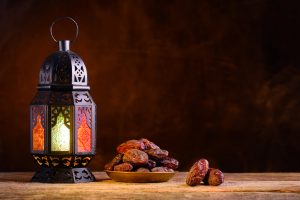
Shahrukh Abid, Canada
‘And Allah will protect thee from men’ [1]
According to the Holy Qur’an, God promised to protect the Holy Prophet Muhammad (sa) from the hands of his enemies. Many attempts were made on his life, ever since the time he received the first revelation. Proof of this is not only found in the Muslim scripture but also in historical literature. Though he remained safe from all the plots to end his life, there are some who wish to cast doubt as to his demise. There are some who believe that the Holy Prophet (sa) passed away due to poisoning. Along with the opponents of Islam, there are even some Muslims who accept this view, but for different reasons; the Muslims who believe that his death was due to poisoning also consider his death to be martyrdom. The critics, on the other hand, allege that he did not receive divine protection and eventually died from the effects of eating poisoned meat prepared by his enemy. If God didn’t protect him, they claim, he could not have been a prophet of God (God forbid!). These allegations are largely due to the incorrect narratives of the events at the time of the poisoning, as well as the misunderstanding of the ahadith (sayings of the Holy Prophet (sa)) related near the time of the Holy Prophet’s (sa) demise.
The Poisoning Incident
The circumstances surrounding the poisoning incident have been outlined by the Second Caliph, Hazrat Mirza Bashiruddin Mahmud Ahmad (ra) who, writes:
‘A Jewish woman asked the Companions (ra) what part of an animal the Holy Prophet (sa) preferred to eat. She was told that he preferred the shoulder of lamb or goat. The woman slaughtered a goat and made cutlets on hot stones. Then she mixed with them a deadly poison, especially in pieces cut from the shoulder, believing the Holy Prophet (sa) would prefer them. The Holy Prophet (sa) was returning to his tent, having led the evening prayers in congregation. He saw this woman waiting for him near his tent and asked, ‘Is there anything I can do for you?’ ‘She said, ‘Yes, Abul-Qasim, you can accept a present from me.’ The Holy Prophet (sa) asked a Companion to take whatever the woman had brought. When the Holy Prophet (sa) sat down to eat his meal, this present of roasted meat was also laid before him. The Holy Prophet (sa) took a morsel. A Companion Bashir bin Bara (ra) bin Ma‘rur also took a morsel. The other Companions present at the meal stretched their hands to eat the meat. But the Holy Prophet (sa) stopped them saying, ‘My hand has informed me that the meat has been poisoned’.’
He further writes,
‘The Holy Prophet (sa) then sent for the woman and asked her if she had poisoned the meat. The woman asked the Holy Prophet (sa) how he ever got to know about it. The Prophet (sa) was holding a piece of the goat in his hand, and said, ‘My hand told me this,’ The woman then realised that the Holy Prophet (sa) had discovered the truth. The woman admitted what she had done. The Holy Prophet (sa) asked, ‘What made you commit such a heinous act?’ She replied, ‘My people were at war with you and my relations were killed in this battle, I decided to poison you, believing that if you were an impostor, you would die and we should be safe, but if you were a Prophet, God would save you.’ Hearing this explanation, the Holy Prophet (sa) forgave the woman. Otherwise, she would surely have been given the death penalty. This incident shows that the Holy Prophet (sa) was ever ready to forgive those who attacked him and his followers, and punished only when punishment was necessary, when it was feared the guilty one would continue to cause mischief and strife.’ [2]
A companion of the Holy Prophet (sa), Bishr ibn al-Bara’ ibn Ma’rur (ra) was also present at the meal. He partook of a morsel of the poisoned meat and immediately began to show signs of distress. He spent the remainder of his life in extreme anguish. He died one year after this incident as a result of the poison.
It is clear from the above narration that the Holy Prophet (sa) became aware that the meat was poisoned before consuming an amount that may have led to a severe reaction or death.

Understanding the Hadith
Some critics and Muslims, however, claim that the effect of the poison was enough to have had a lasting effect which resulted in his death four years after the incident took place. Responding to the allegation, the Fifth Caliph and Worldwide Head of the Ahmadiyya Muslim Community, His Holiness, Hazrat Mirza Masroor Ahmad (aba) has stated:
‘Some enemies of Islam allege that the Holy Prophet (sa) passed away due to this poison. This has also been discussed in certain books of history and biographies of the Holy Prophet (sa). Certain historians are willing to accept the narrative that the Holy Prophet (sa) passed away due to this poison, as they wish to declare the Holy Prophet (sa) as a martyr. However, this is contrary to the facts. The research cell has also sent a report and I will mention that here. It is written that irrespective of what is said in any book of history or biography of the Holy Prophet (sa) or any Hadith, the Holy Prophet’s (sa) demise was not due to poisoning. If someone asserts this, then either they are ignorant of all the narrations, or they are mistaken. It should be remembered that the incident of the poisoning took place during the Battle of Khaybar, which occurred at the end of 6 AH or the beginning of 7 AH and the Holy Prophet (sa) remained alive for approximately four more years. He lived a healthy life just as he did before the incident and even went for battles. There was not even the slightest change in his routine with respect to his worship or other daily activities. To pass away after approximately four years, owing to a fever and a migraine, no rational individual would assert that his death was due to the effects of poisoning. In actuality, there is a hadith [saying of the Holy Prophet (sa)] recorded in Bukhari as well as some other books of Hadith and owing to not understanding the translation correctly, people have inferred from it that the Holy Prophet’s (sa) demise was due to the effects of poisoning, whereas this is incorrect. The hadith mentioned in Bukhari is as follows – I will mention the translation:
Hazrat Aisha (ra) narrates that during his last days, the Holy Prophet (sa) would say, ‘O Aisha! I have always felt the effects of what I ate at Khaybar. Even today, I feel as if my insides have been greatly affected due to the poison.’ [3]
From this hadith, some Muslims – exegetes and scholars of hadith – have inferred that the Holy Prophet (sa) passed away due to the effects of the poison. Some of them then explain that owing to this, the Holy Prophet (sa) can be deemed as a martyr, whereas this narration does not support this viewpoint. In this narration, the Holy Prophet (sa) simply expressed a sense of pain he felt. Everyone is aware that an injury or [specific] pain can revert at times owing to certain factors. If one analyses the details regarding the narrations about the Holy Prophet (sa) eating poisoned meat at the time of Khaybar, it is also written that the Holy Prophet (sa) put the poisoned meat in his mouth but did not swallow it. Even if he did swallow it, the fact that he lived a healthy life is proof that his death was not a result of the poison. Indeed, the poison would have had a severe effect on the stomach or intestines and this is a natural consequence of it. Likewise, since the morsel was placed in his mouth, it would have affected the uvula and owing to this he may have occasionally felt pain whilst eating.
All the details regarding this incident can be found in the ahadith [sayings of the Holy Prophet (sa)]. It is also written that the Holy Prophet (sa) knew that the meat had been poisoned and he stopped his Companions (ra) from eating it. When the Holy Prophet (sa) called the woman responsible for it and asked her, she said she added poison to see that if the Holy Prophet (sa) was a true prophet of God, he would be saved. Otherwise, they would be rid of him. The Jews even admit to the fact that the Holy Prophet (sa) survived. The poison that was used was fatal, yet the Holy Prophet (sa) survived. In fact, according to some narrations, this woman then accepted Islam. Nevertheless, the Jewish themselves admit that the Holy Prophet (sa) survived and consider this to be a miracle. Therefore, it is utterly false to assert that the Holy Prophet (sa) passed away due to the effects of the poison.’ [4]
It is evident that four years after the event, high fever and headache cannot be considered the fatal side effects of that same poison. Such a strong reaction cannot take place after the lapse of four years. He would surely have suffered major complications to his health in the interim but history bears witness that he lived a healthy and active life. He remained under the protection of His Creator from birth to death and did not succumb to enemy attack. As for martyrdom, one who lives and dies resigned to the Will of God, as did the Holy Prophet (sa), his death by that definition, is most certainly that of a martyr.
About the Author: Shahrukh Abid is a graduate from the Ahmadiyya Institute of Languages and Theology in Canada. He currently serves as an Imam of the Ahmadiyya Muslim Community in Brampton, Canada. He has also co-authored two books titled ‘Quest of Curious Muslim’ and ‘Folly of Atheism’.
ENDNOTES
[1] The Holy Qur’an 5:68
[2] Dibacha Tafsir-ul-Quran, Anwarul Uloom, Vol. 20, pp. 327-329
[3] Sahih al-Bukhari, Kitabul Maghazi, Bab Marad an-NabisawaWafatihi, Hadith 5073
[4] Friday Sermon, November 29, 2019




Add Comment